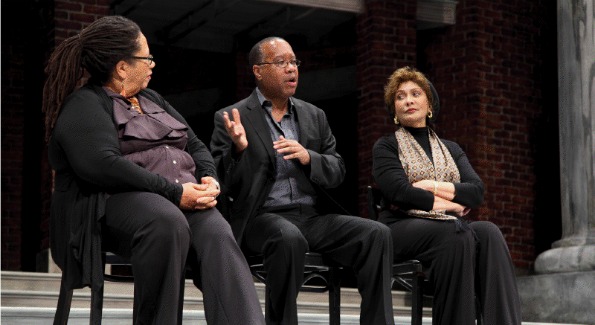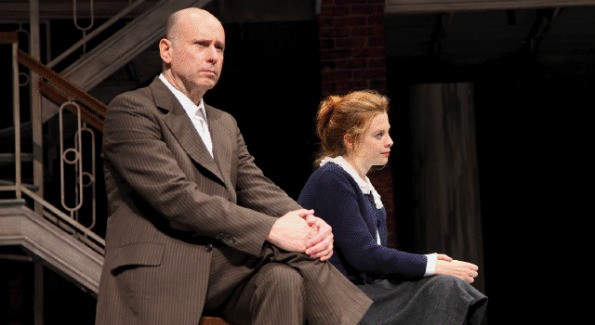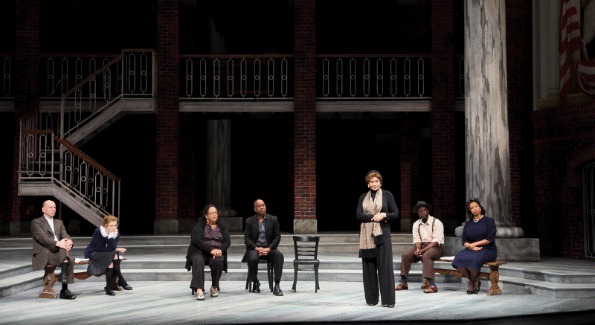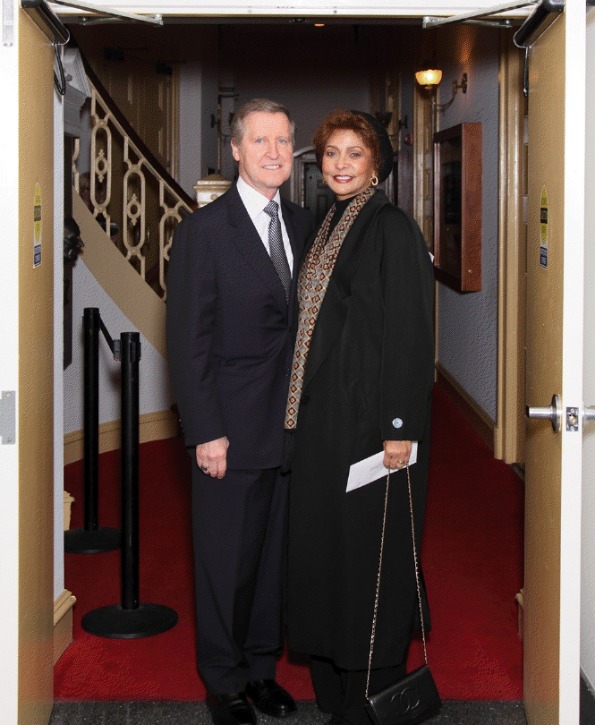Janet Langhart Cohen puts on Anne & Emmet at the Atlas Performing Arts Center.
By John Arundel

Former Secretary of Defense William S. Cohen and his wife Janet Langhart Cohen, co-producers of Anne & Emmett. Photo by Ronald Baker.
The tears and blood mix freely onstage with Anne & Emmett, the powerful one-act play by Janet Langhart Cohen, which performs Nov. 3-6 at the Atlas Performing Arts Center in Washington. The imaginary conversation between two teens, Nazi victim Anne Frank and Jim Crow victim Emmett Till — highly-charged, often wrenchingly emotional – ranges across the tears-of-terror historical maps of the 20th Century, from the death camps of Hitler’s Germany that Frank memorialized in her diaries, to Jim Crow’s South and Till’s brutal murder at the hands of white supremacists, making him a catalyst of a decades-long march for Civil Rights. Nothing is held back here from their highly-charged conversation: The Nazi killing fields, fire hoses in the streets of Selma, White versus Black, German versus Jew.
While many of the plays out of Broadway aim to be funny, whimsical and feel good, Anne & Emmett goes for the emotional jugular and reminds us of a time that can’t – or should be – forgotten. “Black soldiers fought against the Nazis too!” Till cries out to Frank in the play. “We showed that blacks could fight for America too, but we have to sit at the back of the bus…In America, color is your prison.”
Frank, played passionately by actress Andrea Lynn Green, lends a sympathetic ear to Till, a role played vigorously by Claire Hudson III. When Till relates to Frank that he was warned by his elders to, “Be a good boy..don’t be no angry Nigger, now!” Frank urges him “not to let the anger eat you up inside.”
“But you died in a concentration camp! I was beaten, killed and thrown into a river!” Till argues. “If God is so perfect, why did he create such imperfect people?” Frank responds: “The universe is dark enough that we don’t need to snuff out the light.”
The real-life characters of history that Cohen chooses to set her pen upon could not have been less examined by the theatre world. This is a good thing, because the quality of the play’s script reflects the raw emotion of the teens place in 20th century history, and puts squarely into context their central role in changing the darkest side of it.
To this day, Anne Frank (1929-1945) is one of the most renowned and most discussed Jewish victims of the Holocaust, and Emmett Louis “Bobo” Till (1941-1955), an African-American boy murdered in the Mississippi Delta at the tender age of 14 ignited the charge towards Civil Rights in America. Acknowledged for the quality of her writing, her diary became one of the world’s most widely read books, and has been the basis for several plays and films. Frank gained international notoriety only posthumously following the publication of her diary, which documents her experiences hiding during the German occupation of the Netherlands during World War II. The family moved from Germany to Amsterdam in 1933, the year the Nazis gained control over Germany. But by 1940, they were trapped there by the Nazi occupation.
Till was from Chicago visiting his relatives in the Missippi Delta when he spoke to 21-year-old Carolyn Bryant, who was married to the proprietor of a small grocery store. “I just whistled,” Till recalls in the play. “I didn’t mean any harm. I was just playing around… and it cost me my life.” Several nights later, Bryant’s husband Roy and his half-brother J. W. Milam, arrived at Till’s great-uncle’s house where they took the teen, transported him to a barn, beat him and gouged out one of his eyes, before shooting him through the head and disposing of his body in the Tallahatchie River, weighting it with a 70-pound cotton gin fan tied around his neck with barbed wire. Till’s body was returned to Chicago and his mother insisted on a public funeral service with an open casket to show the world the brutality of her son’s killing.
Cohen, the playwright, knows a thing or two about the period, having been a protege of Martin Luther King. Her husband, former Defense Secretary Bill Cohen, is the show’s producer. Catherine and Wayne Reynolds and Paul Tetreault made a reading of the play possible in early October at Ford’s Theatre, as part of the Lincoln Legacy Project, a five year effort in D.C. to create a dialogue around the issues of tolerance, equality and acceptance. Langhart was born in Indianapolis in 1941 as Janet Leola Floyd, and raised in a housing project there by her mother, who worked as a maid and hospital ward secretary.
In her book, Love in Black and White: A Memoir of Race, Religion, and Romance, Janet calls herself multi-racial, having African, European and Native American heritage. In high school, she was a member of the band and debate team, before attending Butler University, a liberal arts college founded by abolitionist Ovid Butler. Much of Cohen’s earlier career was groundbreaking, first as a black model in the early 60’s for Marshall Field’s, to being named Miss Chicagoland, to becoming the first black “weathergirl” for WBBM-TV and later as co-host of Boston’s Good Day from 1973 to 1978.
During her storied journalistic career she interviewed the gamut of history-making personalities, from Civil Rights activist Rosa Parks to white supremacist David Duke. Along the way she became friends with Muhammed Ali and the Rev. Jesse Jackson. She considered Martin Luther King a personal mentor, once giving him a wallet as a gift. The wallet was found in MLK’s back pocket when he was assassinated.
On the afternoon of June 10, 2009, Langhart was on her way to the United States Holocaust Museum for the premiere of Anne & Emmett, which was being presented in honor of the 80th anniversary of Anne Frank’s birth.
“I was running late, and Bill was waiting outside for me,” Langhart recalled. “The guard was holding a parking spot outside for me when a man drove into my spot, got out of the car and opened fire on the guard,” she recalled, speaking of 88-year-old James Wenneker von Brunn, who fatally shot a security guard before being shot himself by the other guards.
The play ends with news flashes from that tragic day.
“It was so ironic that a Neo Nazi would come to a Jewish shrine and kill a black man,” Langhart Cohen said. “When I did the first reading the question was asked, ‘Who has suffered more, the Jews or the African Americans?” Hopefully this play helps to answer the question…Both have.”
Langhart said that she wrote the play for young people. “We have to get them when they’re young,” she said. “Maybe you can’t eradicate [racism] but perhaps you can manage it, because hate unchartered can be a very dangerous thing.”
For more info on Anne & Emmett, click here.Anne & Emmett performs Nov. 3-6 at the Atlas Performing Arts Center, 1333 H Street, NE
Washington, DC. For tickets, log on to www.atlasarts.org








